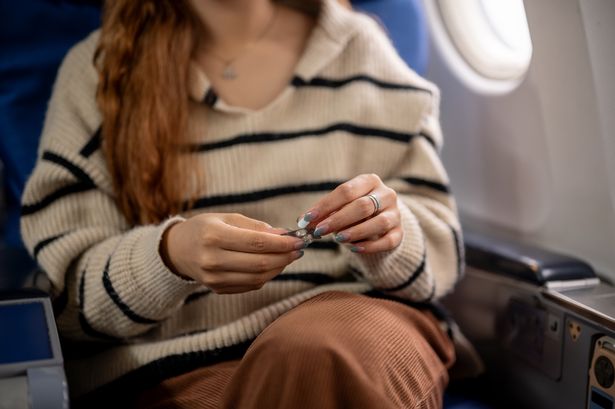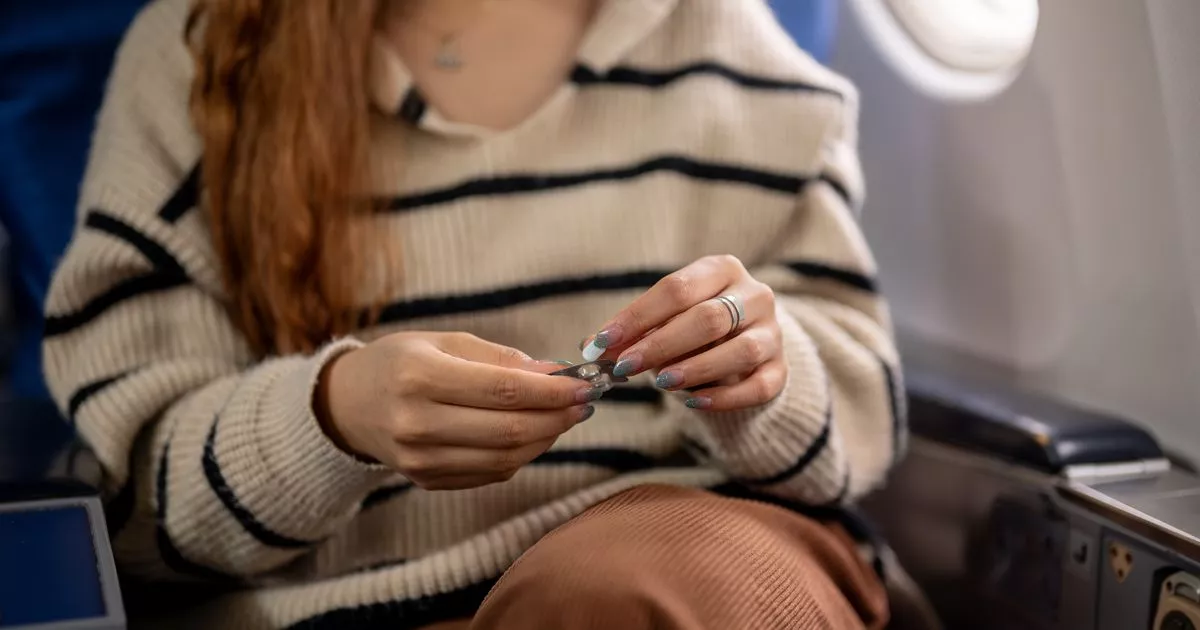A GP warned there are a number of medications you may not be able to take with you when travelling abroad, and it’s worth checking the rules to avoid a surprise at the border. Taking medication on board your flight is subject to some rules by airlines(Image: Getty)
Taking medication on board your flight is subject to some rules by airlines(Image: Getty)
A travel expert and GP has issued a warning about six medications that may not be allowed in your luggage, depending on your holiday destination. Many countries have a limit on the amount of medication you can bring with you.
Typically, people are allowed to travel with up to three months worth of treatment. However, certain countries may impose stricter restrictions based on the type of medication.
Saga Travel Insurance consulted with GP Doctor Deborah Lee from Dr Fox Online Pharmacy to shed light on this often overlooked issue, revealing some unexpected medications you might want to leave at home.
Dr Lee advises: “The vast majority of commonly prescribed medicines are completely safe to travel with. But some are more strictly regulated.”
So which medications should you be wary of? The Mirror have complied a list of six medications you may not be able to fly with.
 Some medications aren’t permitted(Image: Getty Images)1. Codeine
Some medications aren’t permitted(Image: Getty Images)1. Codeine
Doctor Lee points out “despite being available over the counter in the UK in the form of co-codamol (codeine with paracetamol), this opioid painkiller is banned without proof of prescription in some countries, being classed as a narcotic.”
This means if you’re jetting off to “countries such as Saudi Arabia or Greece”, you’ll need a prescription to bring any codeine-containing medications into the country, and there may be limits on the quantities you can carry.
Discussing another favoured destination, they said: “Japan has very strict rules and restrictions on narcotics and will require you to apply to import and export your medication as well as have a medical certificate for them from Japan’s Narcotics Control Department.”
2. Sleeping tablets
The medic reveals the UK offers a “large variety of prescription and over-the-counter sleeping tablets available. However, many sleeping tablets require a prescription in popular European travel destinations (such as France, Germany, and Spain) and are banned in several Middle Eastern and Asian countries, including Japan and the UAE.”
3. ADHD medications
According to the British Medical Journal (BMJ), there’s been an 18% increase in ADHD prescriptions year-on-year in the UK since the Covid pandemic. Just like the UK, “you need a prescription to access this type of medication in most of the world, and you may be required to present your prescription on entry to other countries.”
4. CBD oil
A report from the Centre for Medical Cannabis suggested the UK’s CBD market was projected to be worth £1 billion in 2025, a significant rise from its £300 million market value just five years prior.
“CBD is the non-psychoactive chemical derived from cannabis. In recent years it has become an incredibly popular remedy for pain relief and relaxation and is available over the counter in the UK, though there is limited medical research to show their benefits.
“Some countries have incredibly strict anti-cannabis laws which also extend to CBD oils. Singapore, the UAE, Saudi Arabia, and China, all have bans on CBD oils. In Australia, New Zealand, Norway, Denmark, and Brazil, the only legal CBD oils are those for medical purposes and these require a prescription”, Lee warns.
5. Decongestants
Pseudoephedrine, an ingredient found in popular over-the-counter decongestants like Vicks and Sudafed, is banned in countries like Japan and the UAE. In others like Australia, you may need a prescription or special permit to bring pseudoephedrine-containing products with you.
6. Vapes and e-cigarettes
Although vape pens and similar devices are not prescription medications, many people use them as aids to quit smoking. Some countries, such as Belgium, France and the UK have banned disposable vapes that contain nicotine.
“However, vaping is strictly banned in Singapore, India, Australia, and Qatar”, the expert advises.
Taking medicine out of the UK
According to GOV.UK, “you must carry medicine containing a controlled drug with you in your hand luggage when entering or leaving the UK. It may be taken away from you at the border if you cannot prove it was prescribed for you.”
Bringing medicine back to the UK
UK residents who have been prescribed medication whilst abroad are required to get in touch with the Drug and Firearms Licensing Unit (DFLU). Non-UK residents, on the other hand, must carry a letter of proof that the medicine was prescribed for them.
The letter should include:
your namethe dates you are travelling to or from the UKa list of your medicine, including how much you have, doses and the strengththe signature of the person who prescribed your drugs
You’re permitted to bring back up to a three-month supply of your medication. Your GP or pharmacist can provide guidance if your medication contains a controlled substance.
Additionally, you can cross-reference the drugs listed on your medicine’s packaging with the controlled drugs list. The list does not specify names of medicines, only the drugs used within them.

